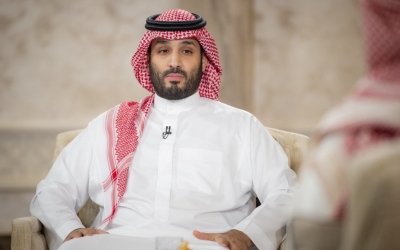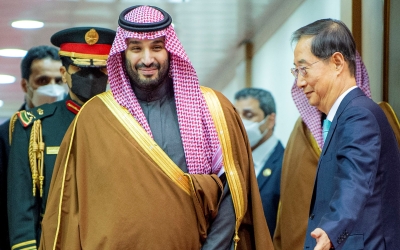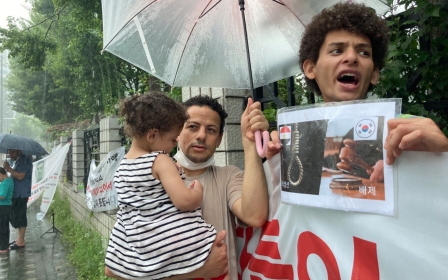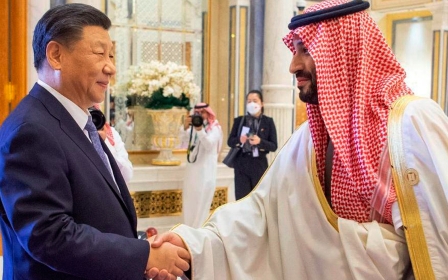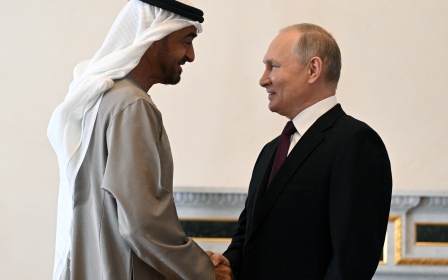Could South Korea-Saudi Arabia military ties challenge US hegemony?
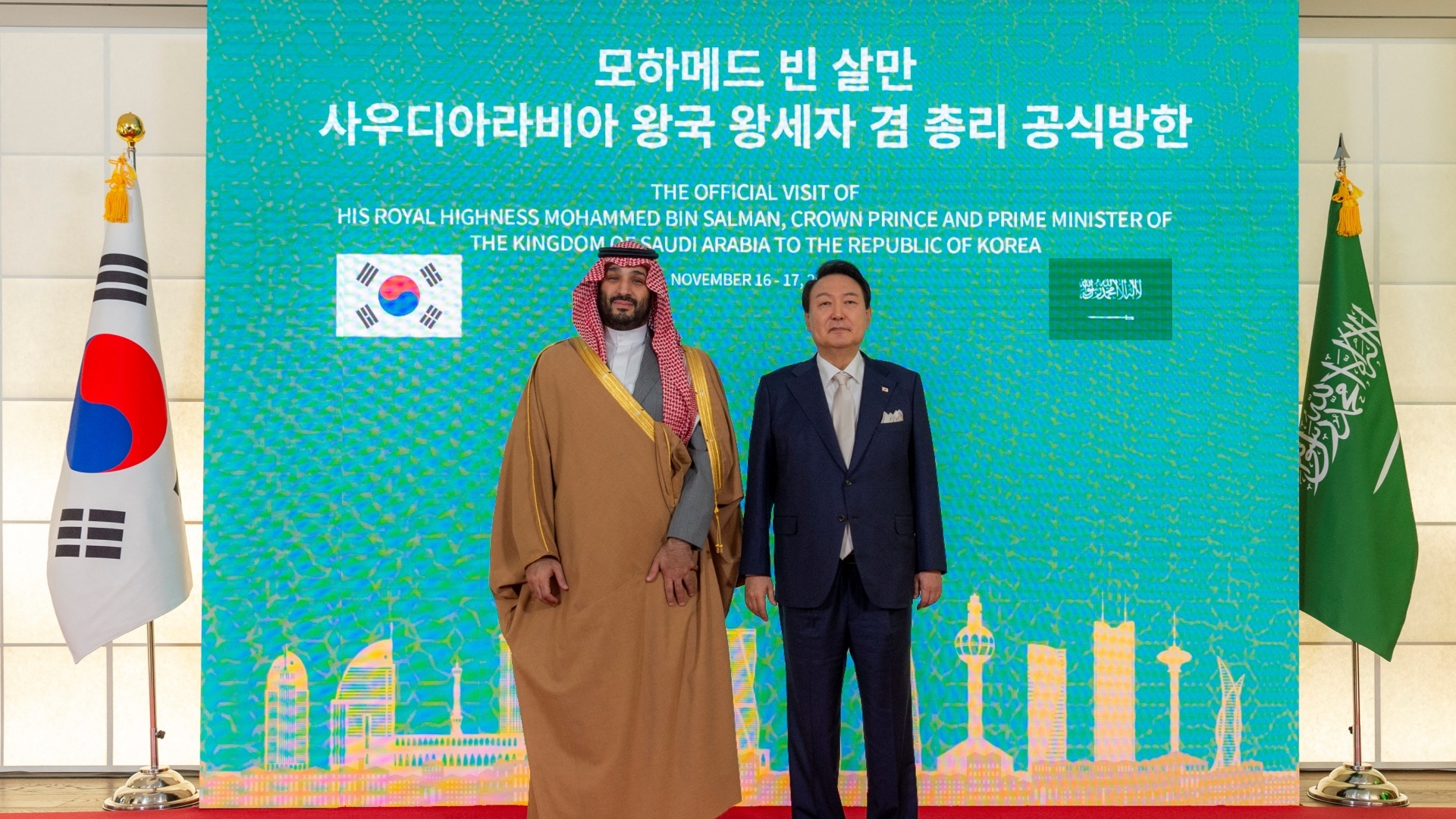
The deepening economic and political ties between South Korea and Saudi Arabia, sealed in late November during a summit meeting in Seoul, are the culmination of a relationship that began in the 1970s at the height of the Cold War.
It remains to be seen if this new relationship will be embraced by the United States
During that decade, South Korea, led by industrial giants Hyundai and Samsung, sent dozens of companies and thousands of industrial workers to Saudi Arabia to participate in one of the largest construction booms in world history.
Now, a half-century later, the two countries have moved beyond their simple swap of petro-dollars for infrastructure into expansive partnerships in the high-tech electronics, communications, and military industries that South Korea excels in and Saudi Arabia needs.
Role in 'Vision 2030'
At their November summit, Crown Prince Mohammed Bin Salman and President Yoon Suk-yeol signed over $30bn worth of business deals and pledged to move towards a "future-oriented strategic partnership".
"The crown prince’s visit became an important milestone in taking the bilateral relationship one step farther,” President Yoon, a conservative former prosecutor, said after his meetings with bin Salman. "In particular, [the crown prince] said he would like to drastically strengthen cooperation with South Korea in the areas of defence industry, infrastructure and construction," he added.
For his part, Bin Salman praised South Korean companies for their participation in Saudi Arabia's development and, in a sign of continuity with the past, met with the top executives of Hyundai and Samsung. His visit came nearly a year after he met President Moon Jae-in, Yoon's predecessor, during a Korean state visit to Riyadh.
Most of the discussions in Seoul involved Saudi Arabia's "Vision 2030" plan to diversify its economy beyond oil exports. The centrepiece of this grandiose vision, called "Neom", is a $500bn project to develop a giant "eco-friendly and smart" city in the northwest part of the country.
Just before the summit, major Korean companies signed 26 contracts and memorandums of understanding for Neom projects in construction, petrochemicals, pharmaceuticals, agriculture, gaming, and energy. Future bilateral deals could include a South Korean role in Saudi Arabia's first nuclear power plant and an increase in South Korean military technology transfers to the oil-rich kingdom.
But it remains to be seen if their new relationship will be embraced by the United States, which maintains deep military ties with both countries and views them as essential partners as it seeks to build Cold War-type alliances to counter and confront Russia, China, and Iran.
In recent years, US relations with both countries have been fragile. Saudi Arabia has come under withering criticism from US liberals and conservatives for human rights violations, including the 2018 murder of US journalist Jamal Khashoggi and Saudi conduct in the war in Yemen.
Over the summer, the Biden administration angrily said it would "reassess" US-Saudi relations after Riyadh joined Russia in voting to slash oil production, allegedly violating a secret pledge to increase its output.
Unsteady allies
Until President Yoon was elected earlier this year, Seoul was widely seen by Washington insiders as an unsteady ally willing to make concessions to North Korea and China, yet unable to drop World War II grievances and reconcile with Japan, America's most important ally in the Pacific.
Early in his term, Yoon, who has sought to reverse Moon's engagement policies, was criticised for snubbing House Speaker Nancy Pelosi during her visit to Seoul, and then publicly insulting Congress by describing its members as "idiots" after a short meeting with President Biden in New York.
"The Republic of Korea’s sense of entitlement may be as great as in Saudi Arabia," Doug Bandow, a prominent critic of US military alliances abroad, wrote in October in an article that called for a re-evaluation of US ties with those countries.
These alliance structures, however, are critical to US strategy. Under President Joe Biden, the Pentagon has emphasised the importance of US-led multinational alliances, and sought to link regional partners together with weapons and communications systems all parties can use. This policy of "interoperability," particularly with South Korea and Japan, inevitably favour American defence giants such as Lockheed Martin.
That was made clear in 2019 when Randall Schriver, then the assistant secretary of defence, praised Seoul and Tokyo for their "substantial investments in US equipment". Speaking at the Center for Strategic and International Affairs, Schriver said "we’re happy to see that, not only because it’s good for industry but because it helps with interoperability and it helps the overall capability of the alliance."
In this context, US defence officials may not want to see South Korea and Saudi Arabia drift from these alliance structures and become more independent of the Pentagon.
As the Korea-Saudi relationship veers into security and South Korea expands its military industry, the possibility looms of a clash over the scope of their bilateral ties and the potential impact of Korean exports on US arms sales.
One factor is South Korea's stunning rise as a global arms supplier. Last August, President Yoon announced plans to elevate his country into the top tier of military contractors. "By entering the world’s top four defence exporters after the United States, Russia and France, the (South Korean) defence industry will become a strategic industrialisation and a defence powerhouse," Yoon declared.
New military powerhouse
South Korea is currently the world’s eighth-largest weapons maker, and its exports of such items as combat aircraft, missiles, artillery, tanks, and small arms increased 177 percent between 2016 and 2022.
In 2021, Korea’s arms exports tripled to a record $7.3bn from $2.6 bn in 2016, according to the Korean government, and are expected to exceed $10bn in 2022, according to the Export-Import Bank of Korea. The leading Korean firms are Hanwha Defence, Hyundai Rotem, and Korea Aerospace Industries.
In recent months, Korean firms have signed multibillion-dollar deals with Poland, including a sale by the Hanwha Group of nearly 300 multiple rocket launchers. Poland also announced a massive deal from two other Korean companies for tanks, self-propelled howitzers, and fighter planes that could be worth up to $15bn.
The size of these contracts has grabbed the attention of US companies that dominate the world market. According to the influential Politico, South Korea's weapons sales to Europe is "causing some jitters" in the US military industry, which has long seen the Republic of Korea as a safe and dependable market for American weapons.
It quoted an industry insider saying that there is "concern" inside the massive US industry that the Korean deals "won't stop with Poland".
South Korea is already a major supplier of sophisticated weaponry to the UAE, which in 2021 cut a $3.5bn deal for Korean surface-to-air missiles. That lucrative deal, the largest overseas sale ever for South Korea, was expected to "boost the competitiveness of local defence companies on the global stage," the Korea Times reported.
Korea's next big market
Now, with the Saudi interest, the Middle East may be the Korea's next big market after Europe.
Military cooperation between Seoul and Riyadh took a crucial step in 2013, when the chairman of the Korean Joint Chiefs of Staff came to Saudi Arabia to sign an agreement to boost defence cooperation in a wide range of areas, including the arms industry, logistics support, military exercise and training.
Last March, Saudi Arabia's Defence Ministry signed an $800m deal with Hanwha to support its defence capabilities. It also signed contracts with three unnamed Korean defence companies collectively worth $989m.
Details of those sales have not been disclosed, probably because of their sensitivity.
After Saudi Arabia was banned by the Biden administration from importing US offensive weapons because of its involvement in the civil war in Yemen, it began looking "for imports of defence systems from other countries, including Korea", South Korea's Joongang Daily reported. Accordingly, Hanwha is seeking to sell the Saudis weapons such as Biho-II, an anti-aircraft defence system.
To do that, it will have to withstand US scrutiny.
Up to now, most of South Korea's overseas sales in Europe have been coordinated with the Pentagon. In mid-November, for example, US defence officials told reporters that the Pentagon would buy "100,000 rounds of howitzer artillery from South Korean manufacturers to provide to Ukraine" and said the two governments had worked together on the deal.
But US demands for cooperation amongst its Middle East allies could minimise Korean sales to the Saudis, which has purchased over $100bn worth of foreign military sales from the United States, according to the US State Department.
At a US-Saudi planning committee meeting last May, for example, a senior US official noted that both sides agreed on their "strong desire to expand regional cooperation and security".
Meanwhile, the Pentagon has scheduled an annual military exercise with Gulf countries in Saudi Arabia in May 2023 designed, US Central Command says, to "enhance regional, civil, and military interoperability".
American policymakers are likely to discourage South Korea's military industry from making significant inroads in the lucrative Saudi market
In this strategic environment, American policymakers are likely to discourage South Korea's military industry from making significant inroads in the lucrative Saudi market or the Gulf in general. But such moves to protect US industry could backfire if either country believes that their sovereignty is at stake, or if their bilateral relations with the US take a turn for the worse.
In any case, South Korean military exports will continue to cause heartburn at the headquarters of such companies as Lockheed Martin and Raytheon.
"South Korea is relentless," India's TFI Global News commented shortly after bin Salman's meetings in Seoul. "As Biden continues to destroy US’ relationships with his allies, South Korea sees it as an opportunity. And this time Seoul has attracted a major US ally named Riyadh." Clearly, TFI concluded, the "American military-industrial complex is rattled by South Korea entering the US weapons market".
That may be wishful thinking on the part of the Indian entrepreneur who owns the publication. But it's closer to the truth than the US government's constant talk of alliances and interoperability, which inevitably favour the US defence industry.
The views expressed in this article belong to the author and do not necessarily reflect the editorial policy of Middle East Eye.
Middle East Eye propose une couverture et une analyse indépendantes et incomparables du Moyen-Orient, de l’Afrique du Nord et d’autres régions du monde. Pour en savoir plus sur la reprise de ce contenu et les frais qui s’appliquent, veuillez remplir ce formulaire [en anglais]. Pour en savoir plus sur MEE, cliquez ici [en anglais].



